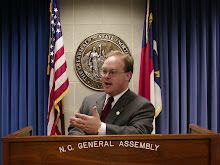Below is the text of a newspaper column I prepared on behalf of the North Carolina Center for Voter Education. What prompted me to draft the initial essay was hearing that Republican Commissioner of Labor Cherie Berry had led the way in skirting the intent of the campaign finance reforms passed by the legislature. The column appeared in newspapers Statewide, though in truncated form in at least one instance.
Some Look for Loopholes in Ethics Laws
By Wayne Goodwin
RALEIGH - You’ve heard the expression about hiding in plain sight? Elected officials and some lobbyists are already exploiting loopholes to avoid new ethics laws about gifts and the wining and dining of lawmakers. And they are doing it right out in the open.
I recently attended a course in the ethics education required annually for North Carolina attorneys. Part of the course was a review and analysis of the new ethics, lobbying and campaign finance reforms enacted in last year’s state legislative session. As the audience listened to the experts talk about the ban on fund raising from lobbyists, I was stunned that there appeared to be one big loophole that no one was even addressing.
"All that legislators and candidates would need to do is just create a new political action committee not designed to promote a specific candidate or legislator. It could be a generic committee for ‘Good Government’ or one formed within their respective political party for their legislative caucus,” I mused. “Those types of PACs would apparently not be prohibited from seeking contributions from lobbyists except during the legislative session, and could pay for all the meals and gifts from lobbyists prohibited under the law."
Maybe I had a little bit more insight, as a former state legislator myself, but surely if this loophole was as obvious to me then someone else would ask about it or even suggest it. But no one did.
Flash forward several months.
News reports revealed that an organization set up for the election of women officials of a certain political party just sent out fund-raising letters to lobbyists to pay for its annual breakfast meeting on the opening day of the legislative session. As part of their invitation, the committee's leaders (including a female statewide elected official and woman serving as a veteran legislator of that party) included an interpretation by legislative staff attorneys declaring the event was okay under the law. This may have been the first overt attempt to breach the intent of the new ban on lobbyist solicitations by elected officials.
Not to be outdone, within a week or so a PAC designed to help elect members of the other major political party to the state Senate followed suit with its own fund-raising letter to lobbyists.
As stated at the outset, it was just a matter of time before this loophole was blown wide open. Of course, it is difficult to prohibit or limit behavior by political committees that are not candidate committees but are more like political party auxiliaries. I am not an expert in election law, but it would seem the First Amendment and various rulings over the years make it almost impossible to close every potential loophole.
However, consider this: Just because it may be legal for certain political committees to solicit donations from lobbyists, that does not make it the right thing to do. The public wanted these reforms to prevent actual and perceived conflicts of interest, as well as address the cozy relationship between some lobbyists and certain legislators' campaign committees. The intent was to limit or prevent all sorts of abuses that have been observed in recent years. Such abuses, in part, have been increasingly displayed in newspaper coverage across the state for some time.
So what should North Carolina do about this latest development?
How about this modest proposal: While it may be legal to solicit contributions from lobbyists, let's seek a voluntary “cease-fire” regarding lobbyists and them paying for meals and gifts via the parties’ political groups and similar PACs.
Let there be an agreement among all such groups that they will not seek campaign contributions from lobbyists to cheat the intent behind the new reform laws. Let there also be an agreement among lobbyists that they will not contribute to such groups as a sign of their commitment to that same intent behind the law.
And let us encourage our legislators and organizations committed to reforms to pursue better laws that will close or at least narrow further loopholes.
Without such a covenant, we will see the further exploitation of any gaps in the law.
And just as what happens when water breaks through the proverbial dam, if we do not act now then we could face the washing away of some reforms designed to ensure more ethical, cleaner elections.
###
(The Hon. Wayne Goodwin represented Richmond, Montgomery, Scotland and Stanly counties in the state legislature between 1997 and 2004. He is a member of the board of directors for the N.C. Center for Voter Education, a nonpartisan organization dedicated to improving elections in North Carolina.)
Saturday, February 17, 2007
Subscribe to:
Post Comments (Atom)


3 comments:
So, I'm not clear. The law doesn't prohibit legislators accepting these meals, etc.? If so, then, actual knowledge of the source of funds should be enough. And, if it prohibits lobbyists paying for them, if they know what they are paying for, the conduit of the funds doesn't seem like it should matter.
Wayne,
Great to know you are out there!
I'm a blogger too. jlthigpen.blogspot.com.
I highly recommend Mr. Goodwin to the blogging world! (Sure fire way to reduce your visibility). haha.
Take care,
Your former "VP"
Post a Comment